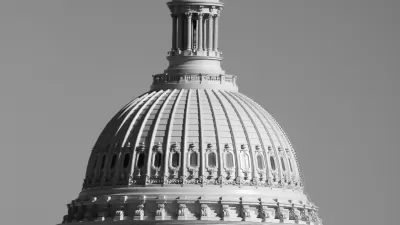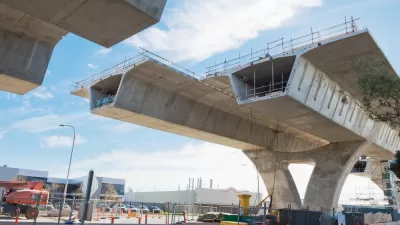A five-year transportation bill has advanced in the House, but it has a long way to go before Americans should expect to see a final federal transportation policy emerge from Congress.

"Democrats on a House committee voted late Thursday to send a far-reaching transportation bill to the full House, a key milestone in a process that faces an uncertain future," reports Michael Laris.
The five-year, nearly $500 billion funding bill, called the Invest in America Act, moves from the House Transportation Committee after two days of debate, according to Laris.
Transportation Committee Chairman Peter A. DeFazio (D-Ore.) is touting the bill as progress toward a more environmentally-friendly approach to transportation planning and investment in the United States. According to Laris's explanation, the bill "puts more importance on maintaining failing roads and bridges than on building new highway capacity, and has as a central goal of reducing transportation-related pollution, the nation’s top source of greenhouse gases causing climate change."
Republicans on the committee oppose the new direction reflected in the bill, calling it the "My Way or the Highway Bill."
Advocates like Yonah Freemark, on the other hand, have criticized the bill for spending far more on highways than on public transit, making it a climate bill in soundbites only. The New Urban Mobility alliance (NUMO), a coalition joining Lime, Lyft, the North American Bikeshare Association, Spin, Transit app, TransitScreen, Transportation for America, Uber and Via, sent to a letter to Congress before the bill passed committee asking for the five-year bill to do more in ensuring safe, equitable access to public transit and micomobility.
As noted by Laris, the House version of the bill is likely to undergo some significant changes to reconcile with any bill likely to pass in the Senate.
FULL STORY: Sweeping transportation bill, with focus on cutting pollution, sent to full House

Alabama: Trump Terminates Settlements for Black Communities Harmed By Raw Sewage
Trump deemed the landmark civil rights agreement “illegal DEI and environmental justice policy.”

Planetizen Federal Action Tracker
A weekly monitor of how Trump’s orders and actions are impacting planners and planning in America.

The 120 Year Old Tiny Home Villages That Sheltered San Francisco’s Earthquake Refugees
More than a century ago, San Francisco mobilized to house thousands of residents displaced by the 1906 earthquake. Could their strategy offer a model for the present?

Ken Jennings Launches Transit Web Series
The Jeopardy champ wants you to ride public transit.

BLM To Rescind Public Lands Rule
The change will downgrade conservation, once again putting federal land at risk for mining and other extractive uses.

Indy Neighborhood Group Builds Temporary Multi-Use Path
Community members, aided in part by funding from the city, repurposed a vehicle lane to create a protected bike and pedestrian path for the summer season.
Urban Design for Planners 1: Software Tools
This six-course series explores essential urban design concepts using open source software and equips planners with the tools they need to participate fully in the urban design process.
Planning for Universal Design
Learn the tools for implementing Universal Design in planning regulations.
Clanton & Associates, Inc.
Jessamine County Fiscal Court
Institute for Housing and Urban Development Studies (IHS)
City of Grandview
Harvard GSD Executive Education
Toledo-Lucas County Plan Commissions
Salt Lake City
NYU Wagner Graduate School of Public Service




























